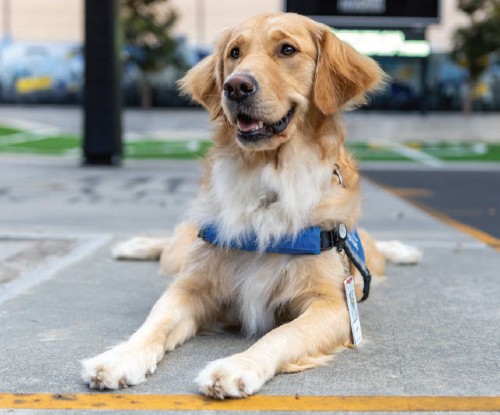About 70% of Annie’s role will be patient support, but the other 30% will be helping our amazing providers, all of whom work in a stressful setting and assist patients with complex disorders.
TIRR Memorial Hermann is thrilled to welcome Annie! A Golden Retriever, Annie is trained to respond to as many as 45 cues that are “very task-specific that can be used to accentuate what’s already happening in therapy” for patients, according to Tara H. Haas, MS, OTR, the facility dog program coordinator at TIRR Memorial Hermann.
“Her skills can be directly translated to the work we do with our patients here,” Haas adds.
Annie comes to TIRR Memorial Hermann from Canine Companions, a leading national provider of specially bred, raised and trained service and facility dogs, founded in 1975. She’s also certified through Assistance Dogs International, which evaluates service dogs for temperament.
“Canine Companions is really the industry standard for service and facility dogs,” Haas explains. “They have an incredible ability to match the perfect dog with the situations and settings they will be working in and the role they’ll be playing.”

Research suggests that facility dogs1:
- Reduce stress and anxiety
- Ease perception of pain
- Decrease feelings of fear
- Lower heart rate and blood pressure
- Improve mood and morale
- Build trust and communication
At TIRR Memorial Hermann, Annie’s role will be to:
- Motivate patients as they engage in therapy and rehabilitation
- “Normalize” treatments and time spent in the hospital
- Help celebrate reaching rehab goals
- Distract during procedures or episodes of pain, such as injections
- Be present during difficult conversations to provide comfort to patients and families
- Enhance patient interactions
- Provide a sense of unconditional love and acceptance.
During her off-hours, Annie lives with Haas and her family, which includes two children and another Golden Retriever. At TIRR Memorial Hermann, she is with Haas all day as she makes her rounds. Haas will work on a rotating schedule so that all TIRR Memorial Hermann staff and patients will have access to Annie.
For her handler role, Haas participated in an intensive training program and certification process through Canine Companions to be specifically matched with Annie and assess her ability to manage a facility dog in a hospital setting.
“It’s so good for a person’s soul to spend time with a dog,” Haas notes. “About 70% of Annie’s role will be patient support, but the other 30% will be helping our amazing providers, all of whom work in a stressful setting and assist patients with complex disorders. Even though she’s just started with us here, Annie is the perfect dog for TIRR Memorial Hermann.”
Reference
1Rodriguez KE, Bibbo J, O’Haire ME. Perspectives on facility dogs from pediatric hospital personnel: a qualitative content analysis of patient, family, and staff outcomes. Complement Ther Clin Pract. 2022; 46:101534.
